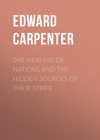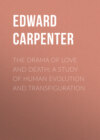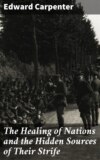Kitabı oku: «The Healing of Nations and the Hidden Sources of Their Strife», sayfa 10
* * * * *
LETTER ON RUSSIA FROM P. KROPOTKIN.
"'But what about the danger of Russia?' my readers will probably ask.
"To this question, every serious person will probably answer, that when you are menaced by a great, very great danger, the first thing to do is to combat this danger, and then see to the next. Belgium and a good deal of France are conquered by Germany, and the whole civilization of Europe is menaced by its iron fist. Let us cope first with this danger.
"As to the next, Is there anybody who has not thought himself that the present war, in which all parties in Russia have risen unanimously against the common enemy, will render a return to the autocracy of old materially impossible? And then, those who have seriously followed the revolutionary movement of Russia in 1905 surely know what were the ideas which dominated in the First and Second, approximately freely elected Dumas. They surely know that complete Home Rule for all the component parts of the Empire was a fundamental point of all the Liberal and Radical parties. More than that: Finland then actually accomplished her revolution in the form of a democratic autonomy, and the Duma approved it.
"And finally, those who know Russia and her last movement certainly feel that autocracy will never more be re-established in the forms it had before 1905, and that a Russian Constitution could never take the Imperialist forms and spirit which Parliamentary rule has taken in Germany. As to us, who know Russia from the inside, we are sure that the Russians never will be capable of becoming the aggressive, warlike nation Germany is. Not only the whole history of the Russians shows it, but with the Federation which Russia is bound to become in the very near future, such a warlike spirit would be absolutely incompatible."—Quoted in "Freedom," also in the "Manchester Guardian," October, 1914.
* * * * *
THE FUTURE OF EUROPE.
Portion of a letter written by P. Kropotkin to Mr. R.J. Kelly, K.C., of Dublin, December 15, 1915.
"The same for the South Slavs and for all nationalities oppressed in Europe. When the last Balkan War had shown the inner power of the South Slavs, I greeted in it the disintegration of the Turkish Empire, which would be followed by the disintegration of the three other Empires—Austria, Russia, and Germany—so as to open the way for two, three, or more federations. A South Slavonic federation—the Balkan United State was the dream of Bakunin—would be followed by a free Poland, free Finland, Free Caucasia, free Siberia, federated for peace purposes. Yes, dear Mr. Kelly, you are right, we are on the eve of great events in Europe. Warmest wishes that this should become a reality, or receive a sound beginning of realization, during the coming new year, and my very best wishes to you of health and vigour.—Sincerely yours,
"P. KROPOTKIN."
* * * * *
SERVIA
"We are therefore justified in declining to accept such evidence. We are witnessing the birththroes of a new nation, the triumph of the idea of national unity among the disunited Southern Slavs, and it is the duty of Britain and France, whose Fleets are now operating on the Adriatic, to insist upon a just and permanent solution, based upon the principle of nationality and the wishes of the Southern Slav race. Only by treating the problem as an organic whole and avoiding patchwork we can hope to remove one of the chief danger centres in Europe."—Lecture at Essex Hall, November 13, 1914, by R.W. Seton Watson.
* * * * *
THE BATTLEFIELD.
"Then the camps of the wounded—O heavens what scene is this?—is this indeed humanity—these butchers' shambles? There are several of them. There they lie, in the largest, in an open space in the woods, from two hundred to three hundred poor fellows—the groans and screams—the odour of blood, mixed with the fresh scent of the night, the grass, the trees—that slaughter-house! Oh, well is it their mothers, their sisters cannot see them—cannot conceive and never conceived these things.
"One man is shot by a shell, both in the arm and leg—both are amputated—there lie the rejected members. Some have their legs blown off—some bullets through the breast—some indescribably horrid wounds in the face or head, all mutilated, sickening, torn, gouged out—some in the abdomen—some mere boys—many rebels, badly hurt—they take their regular turns with the rest, just the same as any—the surgeons use them just the same. Such is the camp of the wounded—such a fragment, a reflection afar off of the bloody scene—while all over the clear, large moon comes out at times softly, quietly shining.
"Amid the woods, the scene of flitting souls—amid the crack and crash and yelling sounds—the impalpable perfume of the woods—and yet the pungent, stifling smoke—the radiance of the moon, looking from heaven at intervals so placid—the sky so heavenly—the clear-obscure up there, those buoyant upper oceans—a few large, placid stars beyond, coming silently and languidly out, and then disappearing—the melancholy, draperied night above, around. And never one more desperate in any age or land—both parties now in force—masses—no fancy battle, no semi-play, but fierce and savage demons fighting there—courage and scorn of death is the rule, exceptions almost none."—From Walt Whitman.
* * * * *
CHINESE CHRISTIANS ON THE WAR.
"The most remarkable attitude yet taken in regard to the war by any body of people in the world is that of the native Christian Churches in China. I was told a fortnight ago by a missionary just returned from China that the Chinese Christians are holding daily prayer meetings to pray for peace. They are also praying earnestly that the Christians in Europe may be forgiven for killing each other, and, in particular, that the British and German churches and ministers may be forgiven for the blasphemy of praying to the Common Father for victory over one another, i.e. for Divine assistance in smashing and maiming and murdering more of their fellow Christians. I am also told that these Chinese Christians appreciate perfectly that for the most part the people to be killed are helpless, innocent workmen, who have had nothing to do with the cause of all the trouble.
"That action of the Chinamen is of the essence of real Christianity. It is the real spirit. It has been expressed in Europe only by the Pope, on the one hand, and, on the other, by the Socialists of the neutral countries and by the I.L.P. in England. It is the echo of the angel song of the first Christmas two thousand years ago. It is the true note, the eternal note. It is the note which will bring mankind back to its senses when the hideous passions, the false idealisms, and the sordid greeds behind this world tragedy are shown up for what they are."—By Dr. Alfred Salter in "The Labour Leader," December 31, 1914.
* * * * *
ESSENTIAL FRIENDLINESS OF PEOPLES.
"This essential friendliness, not between nations, but between people of different nations, is one of the biggest facts of civilization. And yet it has counted for so little that half the nations in Europe are fighting one another. Are the causes, then, that have set us fighting stronger still? Yes, when it is a question of national conscience. And one must regretfully say yes, as long as it is possible for those who rule nations and desire war to carry out their will.
"Is that wicked, mediaeval power—in the hands of the few, but still strong enough to overrule the natural tendencies of peoples towards peace and friendship and to turn their likings into hatreds—is it going to continue when this war is over? Who can doubt, if it were possible to take a plebiscite of all the nations who are fighting now as to whether international disputes should be settled by war or arbitration, what the result would be? Is the desire of the many to have its chance when this war shall be ended, or shall we submit ourselves again to be dominated by the desire of the few?"—From "The Daily News," October 5, 1914.
"At one spot where there had been a fierce hand-to-hand fight there were indications that the combatants when wounded had shared their water-bottles. Near them were a Briton and a Frenchman whose cold hands were clasped in death, a touching symbol of the unity of the two nations in this terrible conflict."—From "The Sheffield Telegraph," November 14, 1914.
* * * * *
RECONCILIATION IN DEATH.
Letter written by a French cavalry officer as he lay wounded and dying in Flanders.
"There are two other men lying near me, and I do not think there is much hope for them either. One is an officer of a Scottish regiment, and the other a private in the Uhlans. They were struck down after me, and when I came to myself I found them bending over me rendering first aid.
"The Britisher was pouring water down my throat from his flask, while the German was endeavouring to staunch my wound with an antiseptic preparation served out to them by their medical corps. The Highlander had one of his legs shattered, and the German had several pieces of shrapnel buried in his side.
"In spite of their own sufferings they were trying to help me, and when I was fully conscious again the German gave us a morphia injection and took one himself. His medical corps had also provided him with the injection and the needle, together with printed instructions for its use.
"After the injection, feeling wonderfully at ease, we spoke of the lives we had lived before the war. We all spoke English, and we talked of the women we had left at home. Both the German and the Britisher had only been married a year.
"I wondered, and I suppose the others did, why we had fought each other at all. I looked at the Highlander, who was falling to sleep exhausted, and in spite of his drawn face and mud-stained uniform he looked the embodiment of freedom. Then I thought of the tricolor of France, and all that France had done for liberty. Then I watched the German, who had ceased to speak. He had taken a prayer-book from his knapsack, and was trying to read a service for soldiers wounded in battle."
The letter ends with a reference to the failing light and the roar of the guns. It was found at the dead officer's side by a Red Cross file, and was forwarded to his fiancée.—From "The Daily Citizen," December 21, 1914.
* * * * *
CHRISTMAS, 1914.
Letters from the Front (from the Daily Press).
"Last night (Christmas Eve) was the weirdest stunt I have ever seen. All day the Germans had been sniping industriously, with some success, but after sunset they started singing, and we replied with carols. Then they shouted, 'Happy Christmas!' to us, and some of us replied in German. It was a topping moonlight night, and we carried on long conversations, and kept singing to each other and cheering. Later they asked us to send one man out to the middle, between the trenches, with a cake, and they would give us a bottle of wine.
"Hunt went out, and five of them came out and gave him the wine, cigarettes, and cigars. After that you could hear them for a long time calling from half-way, 'Engleeshman, kom hier.' So one or two more of our chaps went out and exchanged cigarettes, etc., and they all seemed decent fellows."
* * * * *
"We had quite a sing-song last night (Christmas Eve)," says one writer. "The Germans gave a song, and then our chaps gave them one in return. A German that could speak English, and some others, came right up to our trenches, and we gave them cigarettes and papers to read, as they never get any news, and then we let them walk back to their own trenches. Then our chaps went over to their trenches, and they let them come back all right. About five o'clock on Christmas Eve one of them shouted across and told us that if we did not fire on them they would not open fire on us, and so the officers agreed. About twenty of them came up all at once and started chatting away to our chaps like old chums, and neither side attempted to shoot."
* * * * *
"I suppose I have experienced about the most extraordinary Christmas one could conceive. About seven o'clock on Christmas Eve the Saxons, who are entrenched about seventy yards from our trenches, began singing. They had a band playing, and our chaps cheered and shouted to them. After some time they stood on the top of their trenches, and we did likewise. We mutually agreed to cease fire, and all night we sang and shouted to each other. To cap everything, their band played 'God save the King.'
"When daylight came two of our fellows, at the invitation of the enemy, left the trenches, met half-way, and drank together. That completed it. They said they would not fire if we did not; so after that we strolled about talking to each other."
* * * * *
"On Christmas morning it was very foggy, so we had a short run on the top of the trenches to get warm. When the fog lifted we, as well as the Germans, were exposed. No firing occurred, and the Germans began to wave umbrellas and rifles, and we answered. They sang and we sang. When we met we found they were fairly old fellows. They gave us sausages, cigars, sweets, and perkin. We mixed together, played mouth-organs, and took part in dances. My word! the Germans can't half sing part-songs. We exchanged addresses and souvenirs, and when the time came we shook hands and saluted each other, returning to our trenches."
* * * * *
"On Christmas morning one of the Germans came out of a trench and held up his hands. Then lots of us did the same, and we met half-way, and for the rest of the day we fraternized, exchanging cigars, cigarettes, and souvenirs. The Germans also gave us sausages, and we gave them some of our food. The Scotsmen then started the bagpipes, and we had a rare old jollification, which included football, in which the Germans took part. The Germans said they were tired of the war, and wished it was over. Next day we got an order that all communication and friendly intercourse must cease."
* * * * *
"I went up into the trenches on Christmas night. One wouldn't have thought there was a war going on. All day our soldiers and the Germans were talking and singing half-way between the opposing trenches. The space was filled with English and Germans handing one another cigars. At night we sang carols."
* * * * *
EXTRACT FROM A LETTER PUBLISHED BY THE "Berliner Tageblatt" OF DECEMBER 24, 1914.
The author of the letter is Baron Marschall von Bieberstein, a captain of the reserves and Prussian "Landrat," obviously a kinsman of the late diplomatist and Ambassador in London. He wrote on October 18 from the trenches. He said:—
"Whoever fights in this war in the front ranks, whoever realizes all the misery and unspeakable wretchedness caused by a modern war … will unavoidably arrive at the conviction, if he had not acquired it earlier, that mankind must find a way of overcoming war. It is untrue that eternal peace is a dream, and not even a beautiful one. A time will and must arrive which will no longer know war, and this time will mark a gigantic progress in comparison with our own. Just as human morality has overcome the war of all against all; just as the individual had to accustom himself to seek redress of his grievances at the hands of the State after blood feuds and duels had been banished by civil peace, so in their development will the nations discover ways and means to settle budding conflicts not by means of wars, but in some other regulated fashion, irrespective of what each of us individually may think."
Unfortunately, the writer of this thoughtful letter fell on the battlefield.










